Racial discrimination has been an engrained part of the United States’ history since the country’s inception. Today, it remains a lamentable part of the U.S.’s history that most history classes compel their students to confront and understand without ruining their perception of the U.S.’s exceptionalism.
However, using the word “racism” when speaking about the present, rather than the past, remains a challenge for Americans. In fact, it’s not uncommon to come across individuals who consider the 21st century to be a “post-racial” era, or an era where race no longer influences ordinary lives or crucial policies.
When discussing current events, commentators and even family members will dance around the word “racism.” Acts of discrimination or inflammatory statements can be prerogative against a certain racial or ethnic group, but the threshold for what’s considered truly racist seems to be getting higher and higher.
For years, Americans have remained hesitant to use the word, believing that titling someone as a racist could do more harm than perhaps an actual racist act. In 2019, with questions surrounding the racial prejudices of party politics, Americans have resorted to treating the word “racism” as though the term itself were a slur.
Those 60 Lingering Minutes
The nature and limits of the term “racism” reappeared in social media discussions after U.S. Rep. Alexandria Ocasio-Cortez’s interview with CNN anchorman Anderson Cooper on the show “60 Minutes.” In the interview, Cooper asked Ocasio-Cortez whether she considered President Trump to be a racist. Without a beat, Ocasio-Cortez unapologetically replied, “Yeah, yeah. No question,” to which Cooper asked, “How can you say that?”
Since then, debates have flourished whether Ocasio-Cortez’s claim was correct. Some, like Cooper himself, have suggested that Ocasio-Cortez’s labeling of President Trump as a racist was uncalled for. Instead of perceiving her as a politician making a level-headed analysis of Trump’s policy outcomes, American media and commentators have framed her as someone simply trying to smear Trump’s image with the word “racist.” Nonetheless, anti-Trump spectators have pointed to Trump’s verbal commentary and his own policy decisions to support Ocasio-Cortez’s assertion that he is indeed a racist.
Unlike Ocasio-Cortez, most other politicians and writers are less bold when describing Trump’s attitudes toward people of color in the U.S. In lieu of the term “racism,” writers and everyday laypeople have begun to use the phrases “racially tinged” and “racially charged” instead.
In doing so, Americans are indeed acknowledging that Trump and other far-right politicians are making inflammatory comments regarding race relations in America. Still, the neutrality of the term allows them to avoid the consequences of calling the sitting president of the United States “a racist.” However, by doing so, they are ultimately failing to recognize the gravity of the racial attacks — both the verbal and physical ones — that have surged since Trump has entered office.
A Multi-Headed Monster
Although President Trump might not call himself a racist, the consequences of his policies have produced have directly reinforced the racism that still permeates in the U.S.’s institutions. The reason why racism has remained such a popular subject of study is because it is not limited to just comments made between peers. While it certainly is one of the effects of racism, hurt feelings and verbal insults are just the tip of racism’s legacy. Instead, racism is a system that we often unknowingly are exposed to everyday.
While the n-word and hate crimes are (almost) universally condemned by Americans, the larger effects of racism are some most Americans are not even aware of. Even the way in which neighborhoods are organized can be a direct product of racist assumptions that have endured as a result of redlining policies.
Ultimately, racism can’t be tied down to one individual. Historically, racist acts, ranging from school segregation to genocide, have been the result of collaboration from groups that held significant power. In other words, systemic racism in the past, and currently, depended on the synchronization of different institutions, laws and popular perceptions.
During his brief political career, President Trump has referred to Latin American and African countries as “s— holes” and allegedly claimed that all Haitian immigrants were infected with the AIDs virus. In 2016, Trump claimed that at federal judge in Indiana was not suitable to oversee a lawsuit against him because the judge was of Mexican descent.
Additionally, in his own policymaking, Trump’s direction of the Department of Justice has led the department to lower its projects in defending the civil rights of Americans of color and LGBT people, while also turning a blind eye to the recurring issue of gerrymandering in elections. Evidently, President Trump has been harsher toward minorities than some Americans would like, but most of his racist acts have been more rhetorical.
Certainly, the bombastic statements that President Trump includes in his everyday tweets are not necessarily as dangerous as systematic genocide or the internment of people of color in the U.S. However, American history has shown that the perceptions that the president has latched onto are the same ones that previous administrations have relied on to justify the violence they have committed against Native Americans, black Americans, Asian Americans and Latino Americans.
Therefore, even if Trump and his base of supporters would like to assert that he is not a racist, but rather a “race realist,” his mentality is still one that underpins more grave manifestations of racism.
More Than Just a Label
While President Trump has been the most popular public figure to be called racist, there are numerous others far-right figureheads claiming that they don’t deserve the same title. For instance, Richard Spencer has argued that he is not a neo-Nazi, despite videos of him making Nazi salutes and his calls for a white “ethno-state.”
In addition, U.S. Rep. Steve King denies being a white supremacist, while still having a history of vilifying ethnic minorities. The new trend among political personalities has been to espouse dehumanizing rhetoric against people of color, while still claiming they are not racist, simply because their ideas are not as dangerous as lynching or forced sterilization.
However, like with President Trump’s case, genuinely qualifying for the title of “racist” is not what matters. Instead, what matters is whether an individual is reinforcing the same racial assumptions that perpetuate racially segregated housing, voter suppression or even the higher incarceration rate of black and Latino youth. Rather than focus on whether a politician is offensive enough to the American public’s ears, spectators of Trumpian politics should instead reframe their definition of racism.
Racism is not just the antiquated, unenlightened laws of the 20th century. Rather, it’s what arises when politicians and everyday Americans find themselves reinforcing, whether directly or indirectly, the same ideas that have led previous generations of color to face unjust violence. Therefore, “racist” is not a disparaging term meant to offend a political opponent. Instead, it’s a diagnosis of a larger flaw in U.S. society that Americans are still struggling to recognize.
















